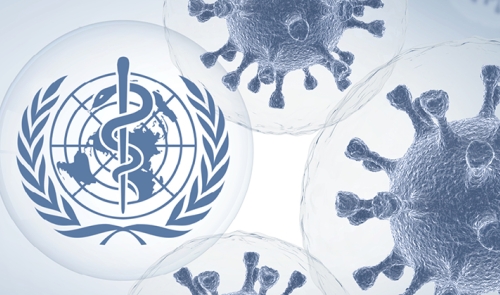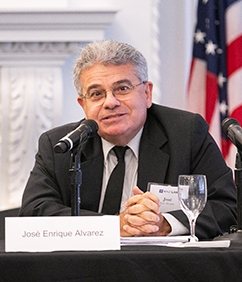The WHO and COVID-19: José E. Alvarez looks at why the global health regime’s pandemic response has been an “abject failure”

“If we did not know it before, COVID-19 makes it abundantly clear that no state can expect to go it alone when it comes to pandemics,” Herbert and Rose Rubin Professor of International Law José E. Alvarez writes in an essay published in the American Journal of International Law.
In fact, he notes, the experience with COVID validates premises in the constitution of the World Health Organization (WHO): global health is dependent on “the fullest cooperation” of countries, and advances in health protection in any nation are “of value to all.” The WHO’s international health regulations also seem well suited to address a threat like coronavirus, Alvarez says, by requiring countries to establish core capacities for disease surveillance and response, and imposing a duty to report outbreaks.
Unfortunately, Alvarez concludes, “the law on the books yields a rosy picture at odds with the state of the world. To many, the devastating impact of COVID-19…demonstrates the global health regime’s abject failure.”
The WHO, Alvarez says, needs to respond to specific criticisms of its response to coronavirus—that it was overly deferential to the Chinese government in the early stages of the pandemic, for example. But his essay, “The WHO in the Age of the Coronavirus,” also connects frustrations with the WHO to broader criticisms of interstate organizations, and why, in his view, many of them are in crisis.
Alvarez teaches and writes on international legal regimes and organizations, including a course on the United Nations for new UN diplomats that has been offered in recent years by the Law School’s Institute for Executive Education. He served as a special adviser to the prosecutor of the International Criminal Court, and is also an expert on foreign investment. Last year, he was named faculty director of the Law School’s US-Asia Law Institute (USALI).
He answered some questions about his assessment of the WHO.
Although your essay focuses on the WHO, you say part of what ails the organization is that the entire “liberal international order” is in crisis. Can you explain what you mean by that?
As I indicate in another essay, “International Law in a Biden Administration,” we are witnessing in real time a paralyzed UN system that has repeatedly failed to protect life, whether in conflict zones like Syria, on migrant-filled rafts in the Mediterranean, amidst forest fires in Australia or California, or in ICUs around the world. There is now widespread skepticism that the UN system works as intended to protect life.
You say that the WHO needs to overcome its state-centered roots—essentially be more independent. But how can that realistically occur, given that a significant portion of its budget comes from member states, and its officials are appointed by states and accountable to them?
In fact a substantial part of the WHO budget now comes from, for example, the Bill and Melinda Gates Foundation, so states are actually not the only holders of the purse strings. Nor are states the most legitimate depositories of impartial information or apolitical expertise. As COVID has taught us, it is not the best policy to rely on governments to tell us the truth.
More and more people are realizing that we need greater reliance on front line medical personnel and public health whistleblowers, and not government officials with axes to grind. Of course, the WHO’s constitution anticipates that those appointed to international secretariats are independent and accountable to the international community and not the governments that nominate them.
As you note, the WHO depends on its technocratic legitimacy and the self-interest of member states to secure compliance with its rules and policies. Yet you say it relies too much on these soft-law techniques. What can give the organization more enforcement teeth?
There are a number of “naming and shaming” techniques that other organizations use that could serve as models. This includes expert bodies to opine on governmental sources of information and ombudspersons. There may also be a role for WHO lawyers to opine on matters of interpretation—such as the proper interpretation of obligations imposed under the International Health Regulations.
Legal and organizational reforms take time. What key steps should the WHO take right now in those areas to be ready for the next pandemic?
There should be no time lost in issuing a “lessons learned” document, complete with a candid assessment of what was known and by whom starting with the first case.
Even before reforms are instituted, states can pledge greater resources to making sure all states have in place the core medical capacities anticipated by the International Health Regulations, along with national plans for action. States cannot provide accurate information if they don’t have the capacity to generate the information to begin with or if their local municipalities or hospitals can’t coordinate at the national level.
What advice would you give to the Biden administration regarding the US’s relationship with the WHO?
Fix it; don’t leave it.
Editor's note: This Q&A was conducted before President Biden took office. President Biden has since announced that the US will remain in the WHO.
How does your work in this area intersect with your role as faculty director of USALI?
In a post on the USALI blog, I discuss what the COVID crisis reveals about the approaches China under President Xi Jinping, and the US under President Donald Trump, take towards the WHO. More broadly, China and other countries in Asia—Taiwan, South Korea, Vietnam, Japan, Singapore—have generally done much better with respect to the current pandemic than some of the touted democracies of the West, including the US and UK. COVID has punctured some myths about the ostensible superiority of rich Western democracies with a proud rule of law tradition when it comes to protecting human life.
COVID poses fascinating questions about the respective roles/importance of culture, history, law, and politics. The variance among countries not only in terms of relative deaths per capita, but also in what seemed “to work” in each place also poses challenges to global scripts for success that can be transplanted everywhere with equal success. For a student of both comparative law and the law of global governance, you can’t ask for a better set of questions.
Posted January 25, 2021


